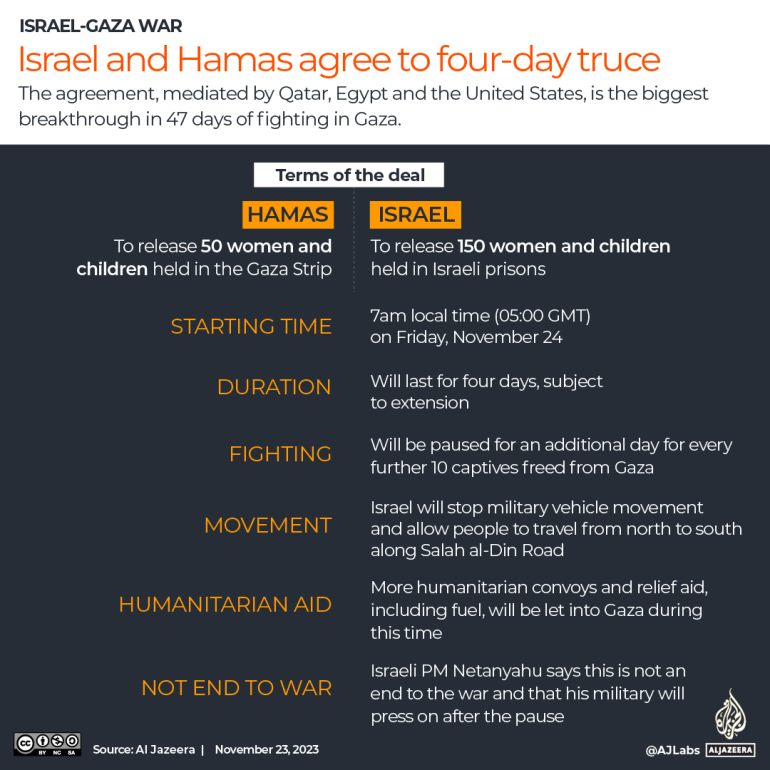Uncertainty, hope for Palestinian, Israeli families before Gaza truce
Amid high tensions over captives-for-prisoners swap, far-right Israeli minister demands clampdown on celebrations.

Both Palestinians and Israelis have shared their mixed reactions to the announcement of a brief truce in Gaza, which will see Israeli captives held by Hamas being exchanged in stages with Palestinian prisoners in Israeli jails.
While there is a sense of excitement and anticipation at the possible release and return of a loved one, there is also a feeling of sadness and disappointment about the relentless war on Gaza and the widespread suffering.
Keep reading
list of 3 itemsMediator Qatar announces key points of Israel-Hamas truce
Palestinians with disabilities face immense hardship in Gaza
Maha Arafat, from Nablus in the occupied West Bank, has been awaiting the release of her daughter Maryam from an Israeli jail.
“We didn’t expect the swap to be this way. So many victims in Gaza. Images that no one can comprehend,” she told Al Jazeera. “Sometimes I’ll say, I don’t want my daughter released. Just let Gaza be. We are so affected by what’s happening there.”
Mediator Qatar announced on Thursday that Israel and Hamas agreed to a four-day pause in fighting, which includes the exchange of some of the captives taken by Palestinian group Hamas during an attack in southern Israel on October 7, for Palestinian prisoners in Israeli custody.
The truce is set to begin on Friday at 7am (05:00 GMT). The first batch of hostages being held in Gaza – 13 women and children – will be released at approximately 4pm (14:00 GMT) and handed over to the Red Cross. Palestinian prisoners are also meant to be released on Friday.
Under the agreement, Hamas will free a total of 50 captives, while Israel will release 150 Palestinian prisoners.
About 5,200 Palestinians were in Israeli prisons before October 7, and 3,000 have since been arrested, including 145 children and 95 women.
Who among the long list of Palestinian prisoners will be allowed to leave and when is in the hands of the Israeli authorities.

Nisreen al-Titi, also from Nablus, and the sister of a Palestinian prisoner, told Al Jazeera that she has mixed emotions about her possible release.
It remains unclear if her sister Aseel – who has been in prison for more than a year after being accused by Israel of trying to stab an Israeli guard while visiting her incarcerated brother – will be freed.
But her family remains hopeful.
“Our uncle was killed, and our brother was shot while Aseel was in prison. She doesn’t know. When she’s released, she’ll see that life has changed,” said al-Titi. “Yes we are happy, but it’s definitely incomplete.”
Israel’s hardline Minister for National Security Itamar Ben-Gvir has instructed the head of the country’s prison service, Katy Perry, to quash attempts to celebrate prisoner releases within incarceration facilities, reported the Times of Israel.
He reportedly also told Israeli police commissioner Kobi Shabtai to use “an iron fist” against attempts to celebrate prisoner releases or support terrorism.
Al Jazeera senior political analyst Marwan Bishara said: “They won’t let the Palestinians mourn or celebrate. If mourning or celebrating isn’t allowed, what is allowed? If you cannot resist peacefully, how else can people bring about freedom for their loved ones?”
Reporting from Nablus, Al Jazeera’s Zein Basravi said that the families of Palestinian prisoners were tense amid news that no West Bank prisoners would be released as part of the deal.
“This is an intrinsic issue for every Palestinian. They have either spent time in an Israeli prison or know someone who has. For Palestinians, this has been a very tense time. We have been speaking to families of people who have been named on the list, but they say they still have not been told anything and have no confirmation,” he said.
“Not knowing is something that has been completely consuming them. There was excitement when we met with them earlier yesterday [Thursday],” he said, but noted that many remain sceptical and believe their family members or others could always be rearrested, as has been the case in the past.
More than 14,500 people have been killed in Israel’s attacks on Gaza since October 7, including nearly 6,000 children. In Israel, the official death toll from Hamas’s assault stands at about 1,200.
“I didn’t win the lottery,” said Guy Metzger, after hearing that his mother was not among the first group of Israelis set to be released.
His parents Tamar Metzger, 78, and Yoram Metzger, 80, were taken captive. Metzger told The Wall Street Journal newspaper that he hoped his mother, Tamar, could still be among the women and children set to be released in the coming days. The deal does not include any adult men.
Gideon Levy, a columnist with Israeli newspaper Haaretz, said the release of some hostages will spark both celebration and mourning in Israel, with many others still being held.
“Right now Israelis are supporting the continuation of the war, but there will be a moment in which Israel will have to ask herself – until when and what will come after and at what price are we going to continue? All those are open questions now and the coming days will show if we are going for another escalation after the truce,” he said.
Basravi reported that “people say they are grateful about the ceasefire but they feel it will be an incomplete happiness if their loved ones are not released”, adding that many fear a truce in Gaza would mean an uptick in the already intensifying raids in the occupied West Bank.